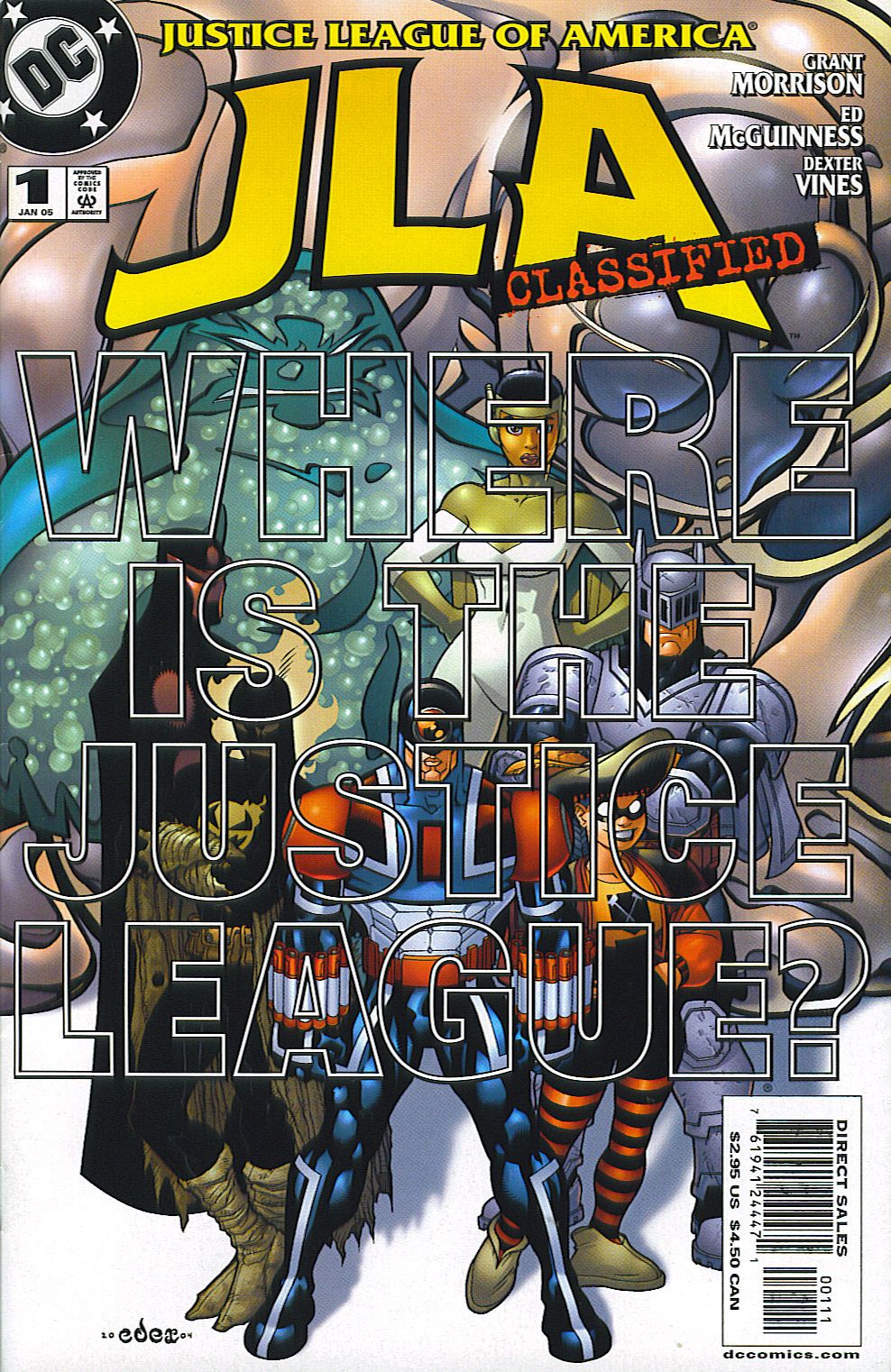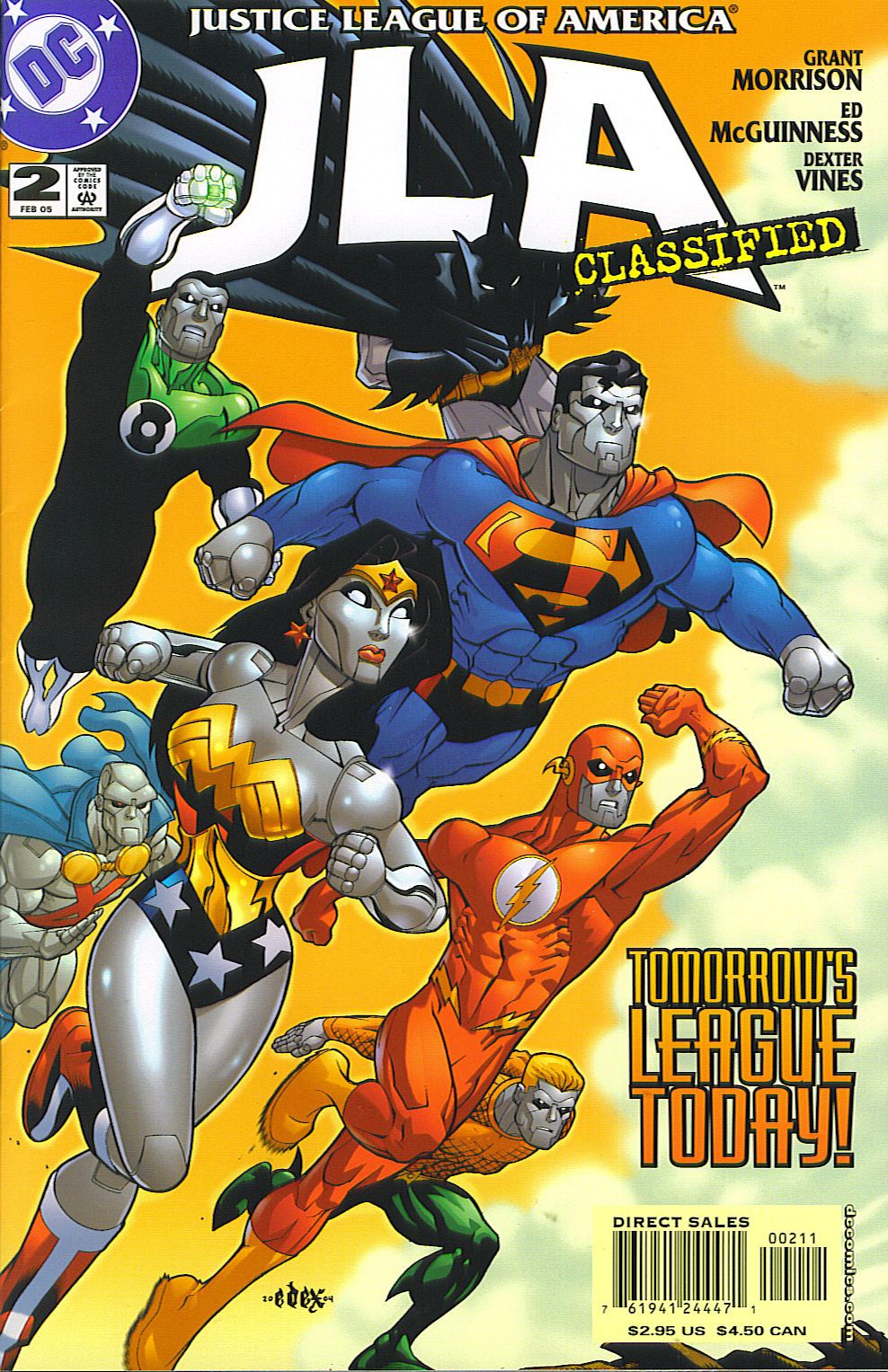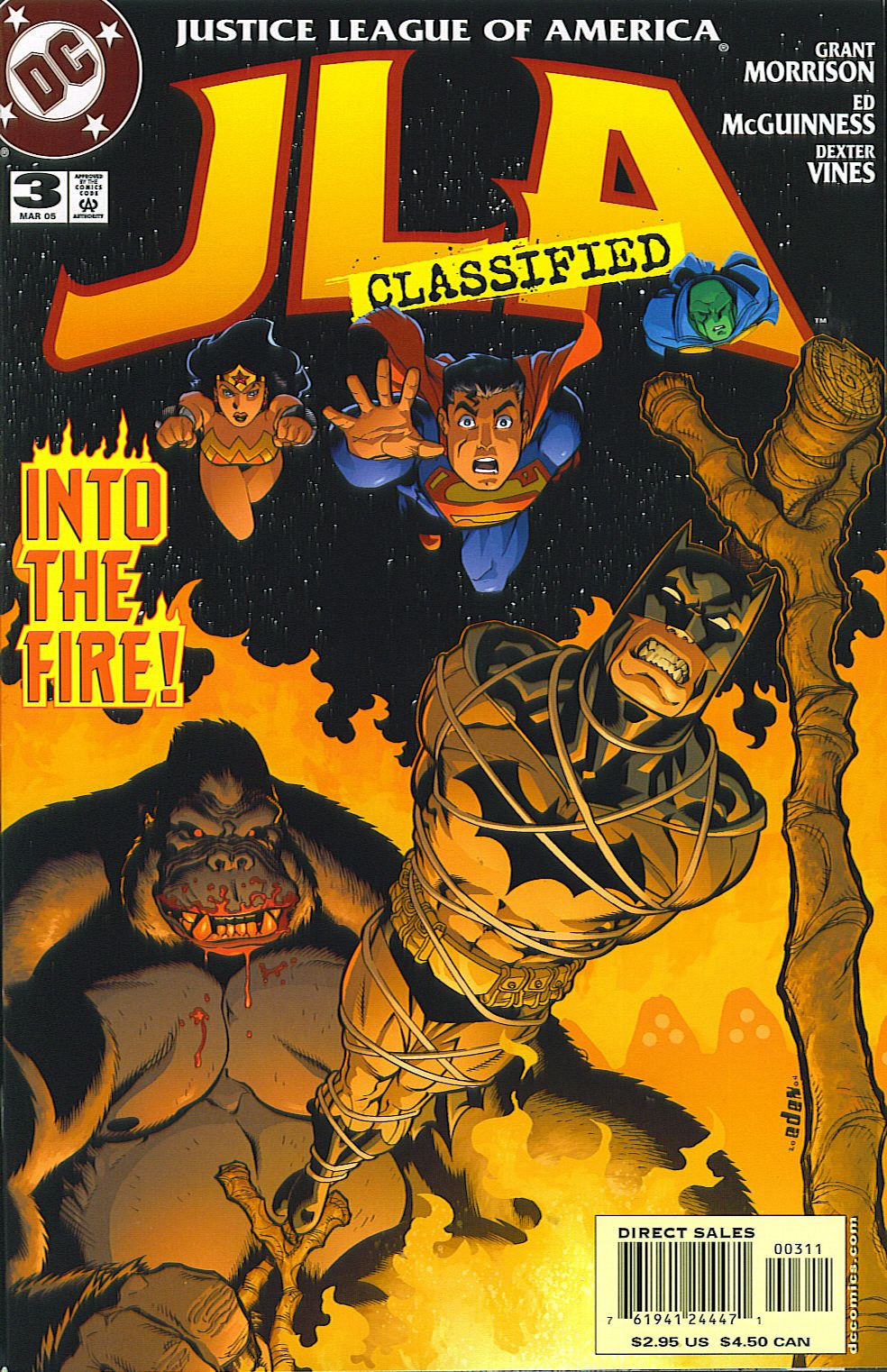Perhaps because I am insane, I thought I would try to break down each issue of Seven Soldiers, the recently-completed epic that has already been broken down in every corner of the blogaxy. As December has 31 days, and there are 30 issues of SS, plus the prologue, what better time than now? It's not like I have any other pressing issues, right? I mean, the kids are old enough to raise themselves. Why should I have any responsibility for them past their first year, right?
I'm not sure what form these reviews will take. I thought about doing annotations for each issue, but other, smarter people than I have already done it, so unless something really strikes my fancy, I'll leave that be. As for actually reviewing these, well, like I said, others have done it, and probably better, and if you haven't already bought these, you're probably not going to and nothing I say will change your mind. But I do want to look at what this epic means, in both the context of simply existing as a story and in the context of the DC Universe, as well as how the issues relate to each other. And that's something we can all get behind, right?
I will say that I was ultimately a bit disappointed with the epic, but not enough to say it was a failure. But that's down the line a bit. So if you're sick of Morrison and all things related to him, you can just skip these posts. That's fine and dandy! Oh, and there will be SPOILERS, naturally. You should have already read these issues!
JLA Classified #1-3 forms the prologue to the entire saga. In terms of story, it's much better than the Seven Soldiers saga proper. Morrison is extremely good at short, punchy stories with lots of crazy ideas that sound impressive, although occasionally it's best not to think about them too much. In this story, he gives us a lot of stuff to chew on, many of it mirroring the themes he will deal with in Seven Soldiers.
The story begins with the International Ultramarine Corps, created by Morrison back in his JLA days, taking on Gorilla Grodd and his army of apes, who have destroyed Kinshasa and generally done lots of nasty things. It turns out that Grodd's entire swath of destruction was a plot to trap the Ultramarines for his ally, a strange creature called Neh-buh-loh, who springs from an infant universe to fill the form of the Master, perhaps the most powerful member of the group. Grodd and Neh-buh-loh defeat the Ultramarines, but one of them - the Squire, a sidekick to the Knight - escapes and contacts Batman. Batman, unfortunately, is the only member of the JLA still around, and he enlists the Squire to contact the rest of the Justice League, who are trapped ... in an infant universe called Qwewq. It is never quite explained how Neh-buh-loh could spring from the same infant universe as is currently at the JLA outpost on Pluto, which is where Qwewq sits. I presume it has something to do with time travel, and that makes my head hurt. Meanwhile, Batman goes after Grodd with robot versions of the JLA. This doesn't work out as well as he would have liked, but it's just a delaying tactic anyway. The Ultramarines who survived the initial assault have hidden away, but the Master is with them, and he is possessed by a spine rider of the Sheeda (more on them later, obviously, as they are the main villains of the epic), who control his central nervous system. He convinces them to submit, and they become pawns of Neh-buh-loh and Grodd. In the infant universe, meanwhile, the JLA is tracking Black Death, a supervillain who has led them to an Earth without superheroes, a place where they can't reveal themselves as who they are. The Squire finally makes contact with them, and they manage to get back to their dimension. They save the day, naturally, and Neh-buh-loh makes some enigmatic statements before vanishing, and the Superman banishes the Ultramarines to the infant universe they just left in order to bring some justice to it. So everything works out in the end.
It's fairly interesting to read this mini-epic, as Morrison brings in many of the themes he's worked with over the years and will bring into full force during Seven Soldiers. The Ultramarines have far more members than seven, but in the initial attack, they use seven members - Warmaker One, the Knight, the Squire, Jack O'Lantern, Goraiko, Glob, and the Master. The Justice League, of course, also has seven members - the seven members of the DC Pantheon, something I've mentioned before but don't feel like going into here. As archetypal as the Justice League is, the Ultramarines have a distinct "modern" feel to them - updated versions of the classics who don't mind killing to get the job done. In fact, Superman implies that it's this willingness to kill that allows the Sheeda to possess them, although there's no evidence of that in the book. In the second issue (page 22) Neh-buh-loh says, "I come to strike down the seven; bred to hunt and kill supermen." He is searching for groups of seven, but neither the Ultramarines nor the JLA are the ones he is looking for. We will have to wait for Seven Soldiers to begin to find out who the seven actually are.
Grodd's plan is interesting, as well. He wants to destroy human civilization and build his own empire on the ashes. This is Grodd's typical modus operandi, but here it takes on more significance, as it ties in closely with the plan of the Sheeda. The Sheeda, as we'll see, want to plunder civilization to sate their own yearning, while Grodd simply wants to destroy it, but it's still something that foreshadows the main saga. Of course, this is a standard theme in superhero comics, so we shouldn't read too much into it, but it's something to consider.
Another theme that comes up in these three issues and will come up again in Seven Soldiers is the idea of living up to a legacy, whether it's a father figure who the heroes need to live up to or something tied into the larger DCU. Beryl Hutchinson, the Squire, signifies the first kind of legacy - she is the Knight's protégé, so of course she looks up to him as a father figure, but once she escapes, she finds Batman, who is father figure to both Beryl and Cyril, the Knight himself. A teen sidekick is an archaic notion in comics, of course, but writers can use this archetype to examine the adolescence inherent in superhero comics. Beryl, in this story, becomes the wide-eyed neophyte who is experiencing the glory and terror of superheroes for the first time, and is, in essence, our stand-in. She manages to get Batman to tell a joke, and she keeps up with him to the extent that he trusts her to stay with the infant universe and attempt to contact the JLA while he fights Grodd with his robots. Beryl is singled out by Superman at the end of the arc for her bravery in, well, running away. But you know what he means! The hierarchy in the DCU has been emphasized in recent years, with Superman, Batman, and Wonder Woman sitting on the top, but the rest of the Justice League - Aquaman, Flash, Green Lantern, and the Martian Manhunter - just a notch below. Moving beyond Beryl's need for approval, Morrison shows us the junior heroes failing in the eyes of the senior heroes and "paying" for their crimes by being given another opportunity. This theme is most evident in the DCU in the Bat-verse, because any hero who happens to wander into Gotham City is immediately accosted by Batman and sent packing, but it's also a standard theme with almost any new hero - his or her book is not validated until an established hero stops by and admires their work. Yes, it's a crass marketing tool, but it's also a good way to induct the heroes into the fraternity. Morrison did something similar in the original Ultramarines story, and here they fall from grace, not because of their failure to stop Grodd, but because of their methods. They would never admit it, but the Ultramarines crave the attention of their betters, and even though they attempt to spin their failure, they know, deep down, that they have let down Superman. And no one wants that.
How does this foreshadow the main saga? The idea of living up to a legacy is present throughout, from the very name of the book to less overt references. The seven soldiers know about the past, and especially in Seven Soldiers #0, are very aware of the legacy. This theme, tied closely to the idea of pleasing a father figure, will re-occur throughout the mini-series that make up the epic, and I'll get to them in time.
Of course, JLA Classified #1-3 introduces a certain plot element that is crucial to Seven Soldiers: the villains, Neh-buh-loh and the Sheeda. Neh-buh-loh has been around the DCU for decades, but Morrison, as is his wont, revamped him for the saga. I am, sadly, not the Cronin-o-matic 3000, so my knowledge of comics history is spotty, so I have no idea what his original origin is, but here he is the adult universe of Qwewq, as opposed to the infant universe of Qwewq. He is the Celestial Huntsman, the vanguard of the Sheeda, and, in my mind, pretty freakin' awesome. He's the kind of villain that Morrison does really well - utterly creepy, really powerful, seemingly unstoppable, and just weird enough to work. He's a freakin' adult universe, for crying out loud! He and Grodd get a lot of the great lines, too - say what you will about Morrison, but he knows how to write zingy one-liners that read great. We learn quite a great deal from Neh-buh-loh, too, that only make sense in retrospect. In issue #1 (page 18), we tells Grodd that a "great harrowing is coming." When Grodd asks him what he is, he says he comes from the "cold region of the vampire sun" and he's preparing the way for the Queen of Terror. When Superman beats him in issue #3 (page 17), he says, "When next my people come, it will be as whispers of death, unseen ..." A frontal assault has failed, so the Sheeda will come more subtly next time. Morrison also foreshadows the fact that the Sheeda come from the far future, so of course Neh-buh-loh has all the time in the world. Morrison has always been a bit obsessed with time travel (it plays a large part in Animal Man, for instance, and is what he based his mini-epic, DC One Million, on), so it's no surprise that it should play a large role in Seven Soldiers.
The final theme that is present throughout JLA Classified #1-3 and the epic itself is the notion of heroism. Morrison has shown his love for the Silver and Golden Ages before (especially the Silver), a love that stretches back even to the beginning of his American comics career. He has always swung back and forth between a Silver Age sensibility and a brutally modern take on comics. Animal Man was a love letter to the Silver Age. Doom Patrol was not, nor were Arkham Asylum and his story in Legends of the Dark Knight ("Gothic," which ran in issues #6-10). Flex Mentallo was drenched in Silver Age goodness, but Invisibles was not. JLA walked the line between the two, as did his Marvel work, Marvel Boy and X-Men. All Star Superman toys with Silver Age ideas. With Seven Soldiers, he is balancing the two again, as he does in this prologue. Grodd is a brutal dictator, eating the president of the Congo and several thousand people in Kinshasa, while Neh-buh-loh speaks of laying a carpet of skulls for his Queen. But Batman dips into his science fiction closet and unleashes JLA robots to fight back. These are just trappings of the Silver Age, however. Morrison is far more interested in what makes someone a hero. According to many comic book fans, the comics back in the "good old days" showed far more heroism than they do today. Whether you believe it or not is debatable, but it's a prevailing trend among comic fans. I have no idea if Morrison himself shares these views (I really can't be bothered to troll Newsarama to find old interviews - Ian might know!), but he is very keen on deconstructing and reconstructing heroes. In this prologue, we see two sides of heroism - the Ultramarines and the Justice League. The Ultramarines fail somewhat miserably, and this makes them suspect in the eyes of the Justice League. They need to be rescued by the JLA, and then they are banished to the infant universe. A cynic might say that the Justice League under Morrison's stewardship were often duped and infiltrated from within, and in one instance, needed to be rescued by Connor Hawke, of all people, but no one suggested they weren't true heroes. But we're not cynical here, are we? What Morrison is suggesting is that the JLA wins because they are true heroes, acting in concert, focused on the goal, and don't get overconfident. Morrison makes it clear that the Ultramarines are far more confident than they have any right to be - on the very first page of the series, Warmaker One predicts that they'll wrap things up in ten minutes. Although the heroes of the Justice League are confident, they aren't cocky. These heroes have learned how to be truly heroic, and the Ultramarines have far to go yet.
This idea translates into the Seven Soldiers saga, as Morrison looks at people who have no experience being heroes and have to learn the way to go about it. These people make mistakes, pay severe consequences, and are forced to modify the way they act. Unfortunately for them, the fate of the world is at stake, and when they make mistakes, the world might suffer.
JLA Classified #1-3 isn't completely necessary to read in order to enjoy Seven Soldiers, but it does add some nice nuances to the main story. It's surprising that DC hasn't included it in the trade paperbacksof Seven Soldiers. It's a definite link to the rest of the epic. And it's a hell of a fun read!




